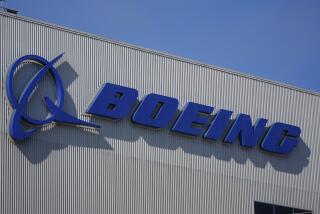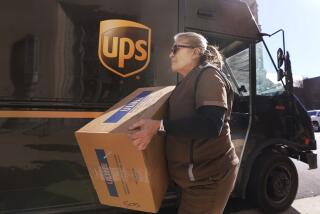Pilots Attack United’s Wage Differential : Say Two-Tier Plan Would Cost New Employee $500,000 in Career
- Share via
A typical pilot hired in the future by United Airlines would lose half a million dollars in potential earnings during his career if the Air Line Pilots Assn. agrees to the company’s demand that it accept a steep two-tier wage scale, according to Henry Duffy, president of the union.
“The strike is as important as any in the union’s history,” Duffy said in a telephone interview from Washington. “United is the biggest carrier in the industry, and the settlement will set a pattern for the rest of the industry.”
Meanwhile, negotiators for United and the pilots met in a suburban Chicago hotel with federal mediators seeking to settle the five-day-old strike. But they were reported to still be far apart on the two-tier issue.
United has proposed to lower the starting pay of United pilots from $22,452 to $21,600. The pay differential would become considerably more significant in the ensuing years. For example, a United pilot currently makes $60,456 in his fifth year with the company. United proposes to lower that to $27,792, but the pilots are contending that that salary should only be dropped to $59,700. A typical United pilot has been with the airline for 19 years and the average pilot salary is $86,540.
Pay Scales to Merge
Duffy said that under the company’s proposal, it would take 20 to 25 years for a pilot hired after a new contract is signed to reach pay parity with a pilot hired earlier. He said the union is willing to maintain separate scales for seven years but it insists that the scales merge in the eighth year.
Currently, the pilots have two-tier contracts with three carriers--Western, Republic and Piedmont. “All those scales merge in the sixth year,” Duffy said.
But Chuck Novak, United’s manager of corporate communications, said the company needs more than the union has been willing to give thus far. He said United must lower pilots’ wages and its other labor costs significantly if it is to compete with American Airlines, which won a permanent two-tier contract with its pilots in November, 1983. Americans’ pilots are represented by a separate union, the Allied Pilots Assn. United also faces competition from Continental Airlines, which declared bankruptcy and abrogated its labor agreements 21 months ago, and new non-union carriers such as People Express.
John Leroy, a pilots spokesman in Chicago, said a long-term two-tier contract would have pernicious effects besides lost wages for the new pilots. “Such a system of pay inherently corrodes the mutual trust and respect” the company has tried to develop through a costly internal program, Leroy said.
Effect on Union
He also said the system would ultimately destroy the ability of the union to function effectively. Leroy said that United plans to add about 1,500 new pilots in the next few years and more thereafter. He said that under the company’s current proposal those pilots would have significantly lower pension benefits as well as lower pay.
“If the company proposed in the future that the older pilots’ pension benefits be lowered--benefits that the new pilots don’t have--we couldn’t get their support for a strike. You won’t be able to mount a united defense against the company,” Leroy stressed. Novak attempted to dismiss this assertion by saying that in 1987 the incumbent pilot force of 5,000 would still be “far in the majority.”
Duffy said the separate scales also will lead to a lack of continuity in a carrier’s pilot force. He said American Airlines already is having difficulty holding on to pilots because of the divisiveness and jealousy caused by its permanent two-tier contract.
Lowell Duncan, American’s public relations director, responded that American had had very few defections among its newly hired pilots. However, he acknowledged that eight months ago, the company began requiring its new pilots to sign an agreement that if they did not stay with the carrier for a year they would have to pay American a $10,000 indemnification fee, the amount it costs American to train a pilot.
American’s Business Up
Duncan said the United strike has generated considerable business for American. He said the carrier’s typical plane is now 82%-83% full, compared to 65% normally. Novak of United said the struck line is operating about 14% of its flights and plans to stay at that level of operation until June 1 if a settlement is not reached. Operations will be stepped up at that time if the strike is still on, Novak said.
In another development, a spokesman for the Federal Aviation Administration said about 20 abusive radio communication interruptions have occurred during United flights, but said they have not presented safety problems. John Leyden of the FAA said that in some instances pilots on other planes had made nasty remarks about pilots flying United planes. He said persons engaged in such conduct are subject to civil and criminal penalties if caught.
UNITED AIRLINE WAGE PROPOSALS Here is how current United Airlines wages for pilots compare with company and union proposals for new pilots:
Year of Contract Current Salary Company plan Union Proposal First year $22,452 $21,600 $22,452 Fifth year $60,456 $27,792 $59,700 10th year $74,232 $45,808 $74,232 20th year $76,404 $52,008 $76,404
Source: Air Line Pilots Association
More to Read
Inside the business of entertainment
The Wide Shot brings you news, analysis and insights on everything from streaming wars to production — and what it all means for the future.
You may occasionally receive promotional content from the Los Angeles Times.










